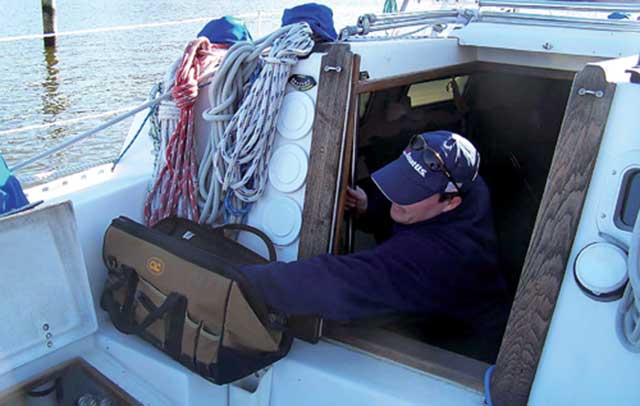Quick & Easy Winter Projects To Make Your Boat Safer (And Avoid Big Headaches Later)

Sometimes, it’s the little things that get overlooked; something as minor as a worn impeller or dead battery can ruin a day on the water. Even major things like a dismasting from a cracked fitting or a ruined engine due to clogged manifolds can be prevented by a quick inspection. This winter, devote some time to a few easy inspections or simple projects to make sure next spring your boat is ready for smooth (and safe) sailing.
Change Your Impeller
As the Nike ad used to say, “Just do it.” Unless you changed your impeller within the last two years, go ahead and replace it. Impellers can fail even (and especially) if they’re not used much. Over time, they take a “set” and the vanes become less flexible and less efficient at moving water. Eventually, the vanes crack at the base and break off, finding their way into your engine’s cooling system where they can cause overheating (and are often very difficult to remove). Replacing your impeller is easy and cheap insurance. If your engine’s pump is hard to access, consider installing a product called Speedseal, which is a replacement cover that uses four knurled screws, allowing much easier inspection and replacement of impellers.

The impeller on the left is worn out; the vanes could break off and get stuck in your engine’s cooling system, causing overheating. Now is the time to replace it if you haven’t done it in a couple of years.
Inspect the Other Zincs

Zinc anodes in the engine’s cooling system wear out like any other anode. Forgetting to replace them can lead to corrosion, ruining expensive components.
Many engines, especially smaller diesels and generators, have zinc anodes in the cooling system to prevent corrosion. Most heat exchangers are made of copper and other dissimilar metals, which can corrode if not protected. The anodes (usually pencil anodes) are screwed into the heat exchanger housing and should be inspected at least once a year; if they’re half wasted, replace them. Check your engine manual to find out if your boat has one.
If you have a water heater, you may have a zinc anode in it as well. Those anodes tend to last a long time (decades), but when they’re finally used up, corrosion can occur. Another surprising issue with worn-out water-heater anodes is that they can cause a foul odor in the hot water when the zinc wears off its iron support rod. These anodes are usually attached to the inside of the water heater’s outlet nipple and can be replaced by removing the nipple.
Read the entire article from Boat US’s Seaworthy magazine here

